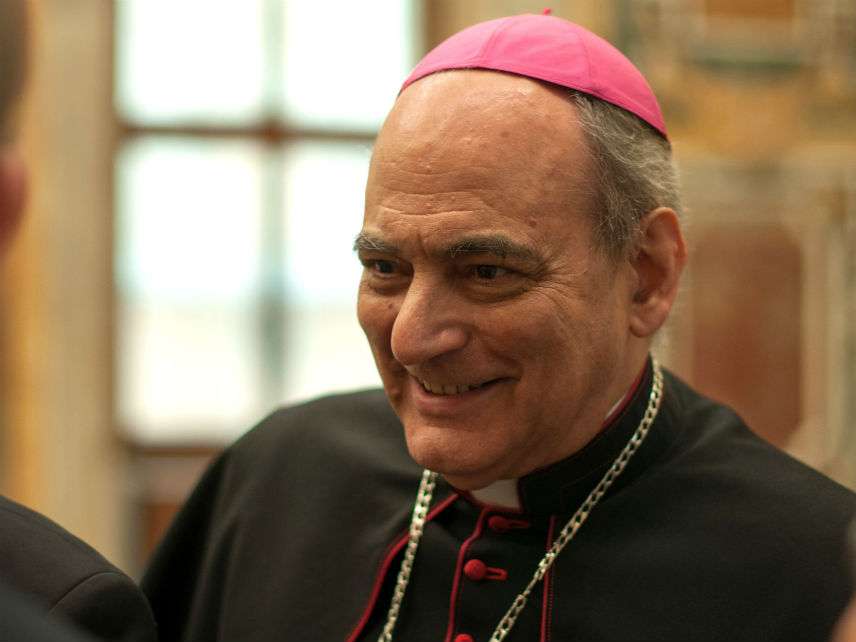Vatican Official Says China, Which Persecutes Christians and Murders Dissidents, Is the Country 'Best Implementing the Social Doctrine of the Church'
An Argentinian bishop in Rome may not be the best authority on Chinese politics.

In his five years as head of the global Catholic Church, Pope Francis has made a number of statements that go well beyond the magisterial purview to teach on faith and morals. Frequently, he steps into the realm of "prudential judgments" on difficult political questions—judgments that involve choosing the best means to a shared end, and judgments about which good and faithful Catholics need not always agree with the pope.
It seems one of his underlings has decided he can do one better, decreeing not just his own policy prescriptions but also his own facts. According to the Catholic Herald, the chancellor of the Pontifical Academy of Social Sciences, Bishop Marcelo Sánchez Sorondo, has told Vatican Insider that China is the nation currently "best implementing the social doctrine of the Church."
Taken a face value, the statement is astounding in its obliviousness. We are speaking of a country where forced abortion and even infanticide are the norm—a country that executes more humans a year than any other on Earth; that harasses, detains, tortures, and disappears its critics on a regular basis; that just last year passed a law to "strangle online freedom and anonymity, and further clamped down on media outlets for reporting that departs from the party line," according to Human Rights Watch; that believes religious activities should be controlled by the state; that broke off relations with the Vatican half a century ago to that end; and that has been appointing its own Catholic bishops without consulting the pope ever since. This is the country Sorondo, recently returned from a visit, calls "extraordinary"?
"What people don't realise is that the central value in China is work, work, work," he said. On climate change, he added, the Communist government is "assuming a moral leadership" in the world. Personally, I'd have preferred that the Vatican assume a bit more "moral leadership" in Communist China.
That the statement comes at a delicate moment makes it all the more frustrating. The Church and the Chinese government have been exploring a possibility of rapprochement, with a Vatican spokesman saying that a new agreement could be inked any day. The move would be a controversial one, which many conservative Catholics around the world strongly oppose.
Catholics in China have for the last five decades been split, with some attending unauthorized "underground" churches, led by priests loyal to the pope, and others attending state-sanctioned churches where the clergy is selected (or at least approved) by the government. In an effort to bridge the gap with Beijing, the Vatican is apparently replacing some of its own bishops with men chosen by the Chinese. At The Washington Post, one writer called the pending deal—which presumably would involve more such replacements and arguably would legitimize the Communist regime—"a capitulation of spiritual authority [that] would damage the Catholic Church in China for years to come."
But there are arguments on both sides. The Church has long wished to mend ties with China, and doing so has been a special goal of Pope Francis over the last few years. As Crux's John L. Allen wrote, the world's largest country offers an opportunity to win souls on an incomparable scale, while better relations could improve the situations of the roughly 10 million Catholics already there. And there are many reasons to support greater openness between countries in general, including that human rights abuses are easier to carry out in places that are closed off from the view of the world. During the Cold War, Pope John Paul II famously charted a middle way between isolation of and capitulation to the USSR. He is remembered for helping to bring down Communism through his dogged support of Poland's Solidarity trade union. Trade with China has already nudged the country into economic liberalization of various sorts over the last couple of decades.
Whether the case for dealmaking is strong enough to overcome genuine fears about the Church sacrificing its autonomy is a question that is open to debate. But Bishop Sorondo's laughable suggestion that China is a model of Catholic social teachings takes a complex, controversial political question and answers it in the stupidest possible way. An authoritarian regime guilty of "widespread human rights violations" (to quote Amnesty International) is not a model of Catholic governance. For a senior Vatican official to suggest otherwise hurts the Church's credibility and will rightly mobilize even greater resistance to both this deal in particular and the Francis papacy as a whole.


Show Comments (52)